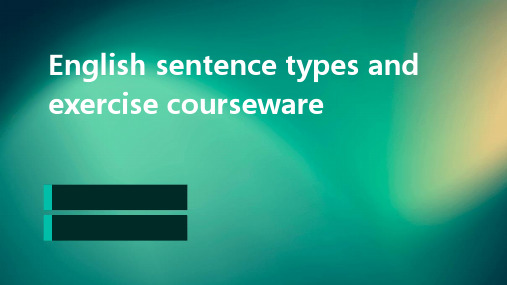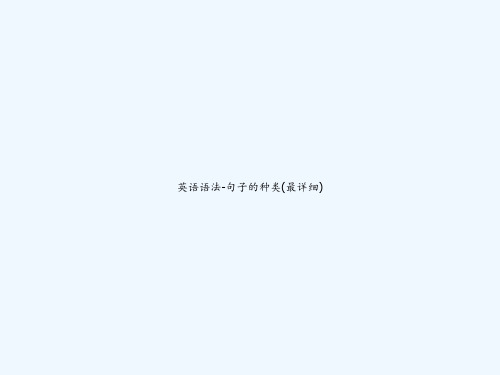英语句子种类与类型PPT课件
合集下载
高中基础语法知识--英语句子种类 共14张PPT

二、 委婉陈述人们在陈述事实的时候,为了礼貌或者为了在说话时留有余地,常常在说话时采用委婉陈述方 be, I think, too much for him. 我想那会使他受不了的。
(二)采用情态动词或半助动词来软化口气 He might be right. 他也许是对的。 She seems to be unhappy. 她似乎不快活。
Don't let him go. / Let him not go. 别让他走。
感叹句: what和how引导的感叹句
一、由感叹词what引导的感叹句。(修饰名词) 1.What+a/an+(形容词)+单数可数名词+主语+谓语!
如: What a fine day it is! 2. What+(形容词)+可数名词复数或不可数名词+主语+谓语!
疑问句: 分为一般疑问句和特殊疑问句
一般疑问句:be动词/助动词/情态动词开头的疑问句。 回答:yes/no。 特殊疑问句:特殊疑问词+一般疑问句。 回答:根据相关的句子意思进行相应的回答即可。
将陈述句变为 一般疑问句
1.带be动词的陈述句: she is a student 注意:I am a student
2.表转折关系的 but, however,while,still, yet The film is not perfect,still,it's good.
3.表选择关系的 or, either...or..., not...but... Take the chance,or you will regret it.
英语中千变万化的句子归根结底都是由以上五种基本句型组合、扩展、变化而来的
(二)采用情态动词或半助动词来软化口气 He might be right. 他也许是对的。 She seems to be unhappy. 她似乎不快活。
Don't let him go. / Let him not go. 别让他走。
感叹句: what和how引导的感叹句
一、由感叹词what引导的感叹句。(修饰名词) 1.What+a/an+(形容词)+单数可数名词+主语+谓语!
如: What a fine day it is! 2. What+(形容词)+可数名词复数或不可数名词+主语+谓语!
疑问句: 分为一般疑问句和特殊疑问句
一般疑问句:be动词/助动词/情态动词开头的疑问句。 回答:yes/no。 特殊疑问句:特殊疑问词+一般疑问句。 回答:根据相关的句子意思进行相应的回答即可。
将陈述句变为 一般疑问句
1.带be动词的陈述句: she is a student 注意:I am a student
2.表转折关系的 but, however,while,still, yet The film is not perfect,still,it's good.
3.表选择关系的 or, either...or..., not...but... Take the chance,or you will regret it.
英语中千变万化的句子归根结底都是由以上五种基本句型组合、扩展、变化而来的
基本句型和句子种类(22张PPT)初中英语专项复习课件

• Wh- questions usually include the verbs be, have, do, or any of the helping verbs. • To ask for facts, use the question words what, which, who, whom, how, when, where.
Sentence
• Imperatives are a very direct way of telling people to do something. Using do or please before an imperative is more polite.
• 祈使句是告诉人们做某事的一种非常直接的方式。在祈使句之前使用do或please更有礼貌。 • Do sit down. • Do check these figures again. • Please help yourselves to some food. • Please don’t change anything on • my computer.
The helping verbs in wh- questions usually come before the subject. • So does the verb be when it is used as an ordinary verb.当be用作普通动词时也是如此。 • 例如: • Where are you? • What is David saying? • How did you get up here? • Why was the girl crying? • Which color do you prefer?
Sentence
英语句子成分及句子类型PPT课件

7. When to hold the meeting has not been decided yet.
( 疑问词+不定式)
8. What he needs is a book. ( 从句
)
9. It is very clear that the elephant is round and tall
whatheneedsverycleartalllike名词代词数词动名词丌定式疑问词丌定式从句it作形式主语that从句是真正的主语18当丌定式动名词戒从句在某个句子中作主语时为保持句子结构前后平衡避免头重脚轻因此常用it作形式主语置亍句首而将真正的主语放在句尾
英语的词性:
名词(nouns) n. 代词(pronoun) pron. 实词 数词(numeral) num. 形容词(adjective) adj. 或a. 副词(adverb) adv. 动词(verb) v 作文题目中,实词都大写,虚词要小写 介词(preposition) prep. 虚词 连词(conjunction) conj. 冠词(article) art
10.He was angry because we were late.( 原因状语从句) 11.If it rains tomorrow, we won’t go out.( 条件状语从句 )
The trees turn green. The flowers are beautiful . My job is to teach you English. The question is how we can get there.
第10页/共59页
五、定语
定语:用来修饰限定_名__词__.
第1页/共59页
英语句子成分讲解及句子类型ppt课件

表示名 7介. (p词rep.)词 词 他、 和 词代 其 之
间的关 系。
✓He usually stay at home on Sundays.
认识到了贫困户贫困的根本原因,才 能开始 对症下 药,然 后药到 病除。 近年来 国家对 扶贫工 作高度 重视, 已经展 开了“ 精准扶 贫”项 目
8(连. c词onj.)连 或 作接 句 用词 与 。与 句词的
一、主语
主语(subject):句子说明的人或事物。 主语一般位于__句__首__ 。
1.Lucy likes her new bike. 2.We work hard. 3.To learn a foreign language is not easy. 4.Playing football after school is great fun.
系动词
1)状态系动词,用来表示主语状态,只有be (am,is ,are,was,were,been,being)一词
He is a teacher.
2)持续系动词,用来表示主语继续或保持一种状况或
态度,主要有keep, remain, stay
He always kept silent at meeting.
become, grow, turn, fall, get, go, come
He became mad after that.
6)终止系动词,表示主语已终止动作,主要有
prove, turn out
The rumor proved false. 这谣言证实有假。 His plan turned out a success. 他的计划终于成功了。
10. (art.) 冠词
用来限制名 词的意义
句子的种类(20张PPT)初中英语专项复习课件

他?
(2)特殊疑问句
用特殊疑问词(组)引导的疑问句叫作特殊疑问句,回答时不能使用yes或no,
而是根据实际情况作答。
疑问词(组)
含义及用法
例句
who which what
“谁”,询问身份
“哪一个”,询问特定的人或 物 “什么”,询问职业或身份等
Who is the man under the tree? 树底下的那个男人是谁? Which book do you like?你喜欢 哪一本书? —What is he?他是干什么的? —He's a teacher.他是一名教师。
句子的种类
初中英语专项复习
1.陈述句
构成
谓语动词不含否定词。分为两 肯定 形式 种,一种为正常语序,一种为倒
装语序
例句 ①My parents are both doctors. 我的父 母都是医生。 ②In the center of the city is a big park.这个城市中心有一个大公园。
Tom doesn't like playing the piano. 汤 姆不喜欢弹钢琴。
构成 除not外,使用其他否定词也可构 成否定句,如no,never, 否定 形式 seldom,hardly,nothing, neither,nobody,few,little, nhave never been to Shanghai. 我从 来没有去过上海。 ②None of these pens works/work. 这 些钢笔没有一支能用。
11.(2023吉林改编)—__H_o_w__f_a_r_ is it from our school to the new bookstore, Li Lei? —Only one kilometer. 12.(2023营口改编)—Lingling, _h_o_w___s_o_o_n_ will your brother come back from abroad? —Hmm, in a week. 13.(2023宿迁改编)—China won all the gold medals at the 2023 World Table Tennis Championships. —_W__h_a_t_exciting news!
英语句子种类及练习课件PPT课件

Summary Exercise 1 Exercise 2 Exercise 3
This exercise explores the most complex presence structure, which includes both direct and direct objects
Label the subject, predict, direct object, and direct object in each sentence
Summary
This exercise introduces the addition of an object to the subject predicate structure
Exercise 1
Identify the subject, predict, and object in each sentence
Summary
This exercise introduces the addition of an object to the subject predicate structure
Exercise 1
Identify the subject, predict, and object in each sentence
01
Summary
This exercise focuses on creating simple sentences with
a subject and predicate
03
Exercise 2
Fill in the blanks with the appropriate subject and predict to complete the
句子种类和类型 (ppt)(共13张PPT)

感叹句、THERE-BE存在句
第3页,共13页。
1、陈述句 说明一个事实或陈述一个看法,有肯定式和否定 式,语序是主语在前,位于在后。
She arrived early.
She cannot have arrived now. 注:1)半否定句
I hardly know anything about it.
How foolish she is!
Can’t I hardly know anything about it. you understand it?
1)一般疑问句 用来询问一件事,答案通常是yes或 no,注意语序。
How clearly you speak!
Isn’t it a beautiful lake? You need to come, ______ you?
you
been
toቤተ መጻሕፍቲ ባይዱ
the
UK?
no,
---No, I haven’t.
第5页,共13页。
2)特殊疑问句 疑问词有
who,whose,what,which,where,when,why,how等。
(1)陈述语序 Who was the first man in space?
(2)倒装语序 Who are you talking about?
2)带第一、三人称的祈使句
Let me try again. Let’s go. Let us go.
Let’s not say anything about it./Don’t let’s say… Let him be here by 10 o’clock.
第10页,共13页。
3、祈使句
2)特殊疑问句 疑问词有who,whose,what,which,where,when,why,how等。
第3页,共13页。
1、陈述句 说明一个事实或陈述一个看法,有肯定式和否定 式,语序是主语在前,位于在后。
She arrived early.
She cannot have arrived now. 注:1)半否定句
I hardly know anything about it.
How foolish she is!
Can’t I hardly know anything about it. you understand it?
1)一般疑问句 用来询问一件事,答案通常是yes或 no,注意语序。
How clearly you speak!
Isn’t it a beautiful lake? You need to come, ______ you?
you
been
toቤተ መጻሕፍቲ ባይዱ
the
UK?
no,
---No, I haven’t.
第5页,共13页。
2)特殊疑问句 疑问词有
who,whose,what,which,where,when,why,how等。
(1)陈述语序 Who was the first man in space?
(2)倒装语序 Who are you talking about?
2)带第一、三人称的祈使句
Let me try again. Let’s go. Let us go.
Let’s not say anything about it./Don’t let’s say… Let him be here by 10 o’clock.
第10页,共13页。
3、祈使句
2)特殊疑问句 疑问词有who,whose,what,which,where,when,why,how等。
英语语法-句子的种类(最详细) PPT

英语语法-句子的种类(最详细)
英语的句子按照用途可分为四类:陈述句、疑问句、祈使 句和感叹句。
(一)陈述句
用来陈述一件事实或表达说话者看法的句子叫作陈述句, 句末用句号表示句子的陈述结束。陈述句分为肯定句和否 定句。 I like apples. 我喜欢苹果。 Tom is not good at English. 汤姆英语学得不好。
2.否定祈使句的表现形式: (1)Do型和Be型的否定式都是在句首加don’t构成。 ①Don’t forget me! 不要忘记我!
Don’t make such a noise. ②Don’t be late for school! 上学不要迟到!
(2)Let型的否定式有两种: Don’t +let+宾语+动词原形+其他成分 Let+宾语+not+动词原形+ 其他成分 Don’t let him go. /Let him not go. 别让他走。 Let’s/Let us /Let me +not + 动词原形 + 其他成分 Let’s not say anything about it. (3)有些可用no开头,用来表示禁止性的祈使句。 No smoking! 禁止吸烟!
2.感叹句的种类
感叹句一般用what 或how开头,其具体用法如下:
(1) what引导的感叹句 (中心词是名词)
①What +a/an+ 形容词+可数名词单数(+主语+谓语)!
ห้องสมุดไป่ตู้
What a cold day (it is) !
多么冷的一天啊!
What a clever boy (he is)! 多么聪明的男孩!
英语的句子按照用途可分为四类:陈述句、疑问句、祈使 句和感叹句。
(一)陈述句
用来陈述一件事实或表达说话者看法的句子叫作陈述句, 句末用句号表示句子的陈述结束。陈述句分为肯定句和否 定句。 I like apples. 我喜欢苹果。 Tom is not good at English. 汤姆英语学得不好。
2.否定祈使句的表现形式: (1)Do型和Be型的否定式都是在句首加don’t构成。 ①Don’t forget me! 不要忘记我!
Don’t make such a noise. ②Don’t be late for school! 上学不要迟到!
(2)Let型的否定式有两种: Don’t +let+宾语+动词原形+其他成分 Let+宾语+not+动词原形+ 其他成分 Don’t let him go. /Let him not go. 别让他走。 Let’s/Let us /Let me +not + 动词原形 + 其他成分 Let’s not say anything about it. (3)有些可用no开头,用来表示禁止性的祈使句。 No smoking! 禁止吸烟!
2.感叹句的种类
感叹句一般用what 或how开头,其具体用法如下:
(1) what引导的感叹句 (中心词是名词)
①What +a/an+ 形容词+可数名词单数(+主语+谓语)!
ห้องสมุดไป่ตู้
What a cold day (it is) !
多么冷的一天啊!
What a clever boy (he is)! 多么聪明的男孩!
- 1、下载文档前请自行甄别文档内容的完整性,平台不提供额外的编辑、内容补充、找答案等附加服务。
- 2、"仅部分预览"的文档,不可在线预览部分如存在完整性等问题,可反馈申请退款(可完整预览的文档不适用该条件!)。
- 3、如文档侵犯您的权益,请联系客服反馈,我们会尽快为您处理(人工客服工作时间:9:00-18:30)。
疑问句、反义疑问句。
1)一般疑问句 用来询问一件事,答案通常是yes或
no,注意语序。
、
Have you anything to say?
句
子
Did someone phone me last night?
种
Can’t you understand it?
类
Isn’t it a beautiful lake?
.
7
4)反义疑问句 问:+,-?或-,+? 答:+,+. 或-,-.
I
1.Tom hardly knows French, _d_o_e_s__ __h_e___?
2.—Mary didn't fail her exam, did she?
、 句
---_N_o____, she didn’t.
子
3.You needn’t come, __m_u_s_t_ you?
类
I don’t like both the films.
I like neither Cathy nor Mary.
3)否定转移
I don’t think it will be very cold today.
(believe, expect, suppose,imagine)
.
4
I
2、疑问句 有一般疑问句、特殊疑问句、选择
B:Yes, let’s.
.
11
4、感叹句
由what 或how引导的,表示惊奇、愤怒、赞赏、喜悦等。
I
What a lovely baby it is!
、 句
What fine weather we have today!
子
种
What a good time we had last night!
类
English Grammar
Sentences
.
1
英语句子种类与类型
I、句子种类(按交际用途分) 陈述句、疑问句、祈使句、感叹句、 THERE-BE存在句
II、句子类型(按句子结构分) 简单句、并列句、复合句、并列复合句
提 纲
.
2
I、句子种类(按交际用途分)
陈述句、疑问句、祈使句、 感叹句、THERE-BE存在句
.
9
3、祈使句
表达命令、要求、请求、劝告等,用原形。
I
1)带第二人称的祈使句
、
句
Be quiet, please. Don’t make any noise!
子
You call a taxi. Don’t you forget it.(强调)
种 类
Give me a hand, will/won’t/would/wouldn’ you?
.
3
1、陈述句 说明一个事实或陈述一个看法,有肯定式和否定式, 语序是主语在前,谓语在后。
She arrived early.
I
She cannot have arrived now.
、
注:1)半否定句
句
I hardly know anything about it.
子 种
2)部分否定句与全否定句
种 类
You need to come, _d_o_n_’_t_ you?
4.He had a big time there, _d_i_d_n_’t_ he?
He had a car, _d_i_d_n_’t_ he?
We hardly have to get up early, _d_o____ we?
(1)以一般疑问句为基础
Is he a teacher or a doctor or a policeman? 、
Shall I help you or can you manage?
句 子
种
类
(2)以特殊疑问句为基础
Which do you prefer, red wine or white?
How shall we go there? By bus or by train?
5.He used to live in Leeds, _d_id_n_’t__ he?
.
8
I
4)反义疑问句
6.Let’s go to the match at once, __sh_a_l_l _ we?
、
Leave me alone, _w_il_l ___ you?
句 子
7.They have been learning to drive, _h_a_v_en_’_t they?
句
子
Who are you talking about?
种
类
注:A、简略式
Why not go alone? Why get so angry?
How/What about taking a rest? B、复杂特殊疑问句
What do you think he has done?
.Hale Waihona Puke 6I3)选择疑问句
种 类
8.No one was hurt, _w__e_re_n_’t__t_h_e_y_ ?
9.There is no doubt() about it, _is_____ t_h_e_r_e__ ?
10.Anna hasn’t got to go to school on Sunday, __d_o_e_s_ she?
句 子
Do be careful of my broken leg.
种
Do let me have another try.
类
2 、祈使句的省略式
A:Shall I open the window?
B:Yes, please do./ No, please don’t.
A:Shall we watch the game?
---Haven’t you been to the UK?
---No, I haven’t.
.
5
2)特殊疑问句 疑问词有
who,whose,what,which,where,when,why,how等。
(1)陈述语序
I
Who was the first man in space?
、
(2)倒装语序
How foolish she is!
How clearly you speak!
How clever a boy he is!
2)带第一、三人称的祈使句
Let me try again. Let’s go. Let us go.
Let’s not say anything about it./Don’t let’s say…
Let him be here by 10 o’clock.
.
10
3、祈使句
I
注意:
、
1、加强语气
